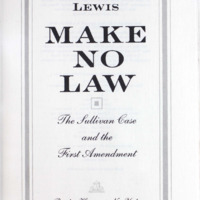-
Title
-
Make no law : the Sullivan case and the First Amendment
-
Description
-
Tells the story of the Sullivan case against the New York Times and the history and evolution of the First Amendment.
-
Identifier
-
400942
-
039458774X
-
Creator
-
Lewis, Anthony
-
Format
-
1st ed.
-
Source
-
Brian Lamb Booknotes Collection
-
Gift of Brian Lamb, 2011.
-
Catalog record
-
Language
-
eng
-
Date
-
1991
-
Program air date: October 20, 1991.
-
Publisher
-
Random House
-
George Mason University. Libraries. Special Collections & Archives
-
Text
-
Transcription of Annotations
Notes on front endpaper: 1. TV in the Court; 2. Sedition Act; 3. John Marshall's attitude toward 1st Amend 62; 4 Eugene Debs-1919-73; 5. Justice Holmes; 6. Impact of Sullivan on civil rights 221; 7. Libel; 8. Chilling effect; 9. Arrogance-208-Sharon/Time. 1.Brennan; 2. Warren Earl; 3. Black Hugo; 4. Goldberg Arthur; 5. White Byron; 6. Douglas William; 7. Harlan John; 8. Clark Tom; 9. Stewart Potter. Notes and underlinings: Heed their rising voices ad appeared in NYT March 29, 1960--sponsors included Eleanor Roosevelt and Jackie Robinson. NYT has trouble retaining an Alabama lawyer. Challenge right of jurisdiction of Alabama courts to bring suit. Judge Jones-forbade NAACP from doing business in Alabama; barred Freedom Rider demonstrations; blocked US Dept. of Justice from examining voter registration records in Alabama; ordered bailiffs to enforce segregation in the courtroom. Stenographic transcription refers to white lawyers as "mister" and black attorneys as "Lawyer". Panel of 36, 2 black. 12 white men selected. Discussion of 12th amendment, Federalists/Republicans. Background of Sedition Act. 1917 WWI--US= jingoistic. Holmes--when nation is at war, will words create clear and present danger that will bring about substantive evils that Congress has a right to prevent. Debs convicted of obstructing armed forces recruitment. Times filed petition for certiorari, Nov. 21, 1962.; granted by Supreme Court, spring 1963 calendar. Chief Justice Earl Warren, Associate Justices John Marshall Harlan, William J. Brennan Jr. At time of Sullivan, oral arguments= one hour argument for each side. Lists judges in order on bench. Feb. 17, Brennan circulated 3rd draft--White and Warren joined opinion. Black, Douglas and Goldberg did not join. Harlan prepared own draft of final section. 20 years after decision, conservative law professor Richard A. Epstein wrote that a generation gas passed and the dancing has stopped. 20 years after Sullivan, libel suits flourishing. General William Westmoreland, General Ariel Sharon. Quotations about Jefferson and the press. Press reluctant to admit mistakes--appears arrogant. Lester Markel worried that Sullivan would lead to irresponsible journalism. Juries tend to side with people suing press for libel. Between 1980-1983 $2,174,633 awarded. Most jury awards against press reversed/reduced by appellate courts. Many question decision. If Sullivan had been allowed to stand, disaster for civil rights movement/American press. Hustler case reaffirmed Sullivan. Underlinings on cases related to offensive speech. Pentagon Papers. Liu Binyan--democracy=power to choose, choice is illusion without information. Underlinings in appendix related to Madison and nature of Republican government. and language.
-
Subject
-
"Sullivan, L. B.--Trials, litigation, etc."
-
"New York Times Company--Trials, litigation, etc."
-
"Libel and slander--United States."
-
"Freedom of the press--United States."
-
"Press law--United States."
-
Relation
-
Original Booknotes interview
-
Rights
-
This work may be protected by copyright laws and is provided for educational and research purposes only. Any infringing use may be subject to disciplinary action and/or civil or criminal liability as provided by law. If you believe that you are the rights-holder and object to Mason’s use of this image, please contact speccoll@gmu.edu.
 400942.pdf
400942.pdf